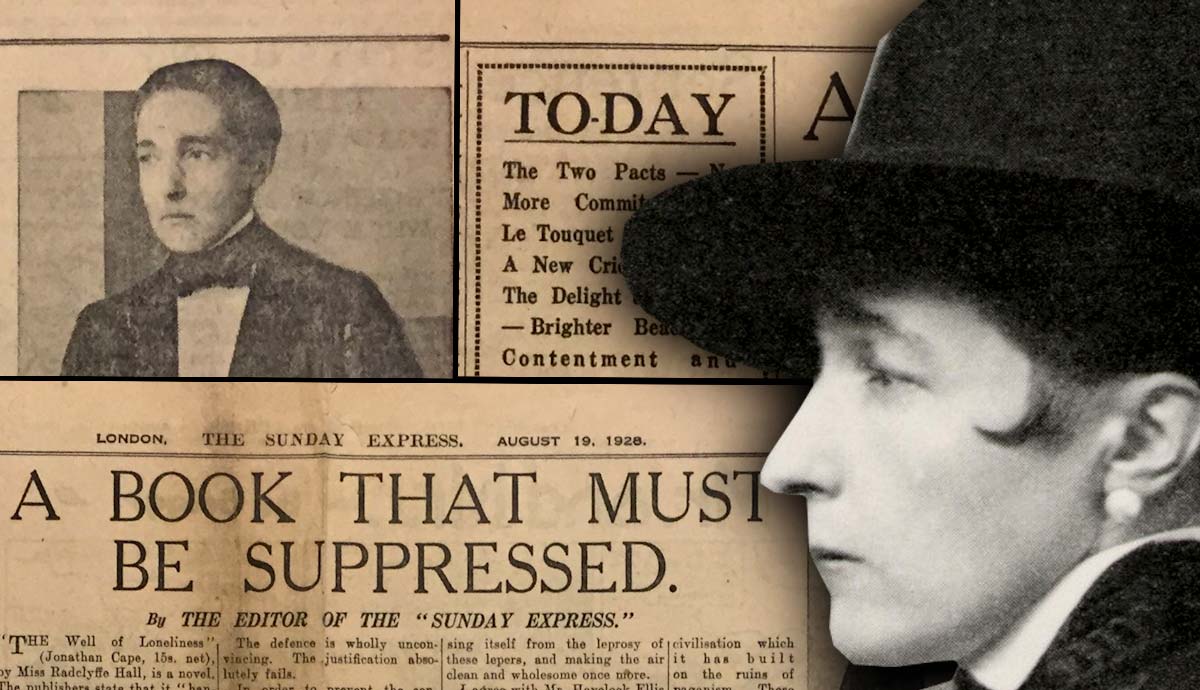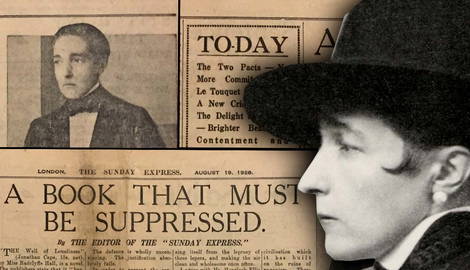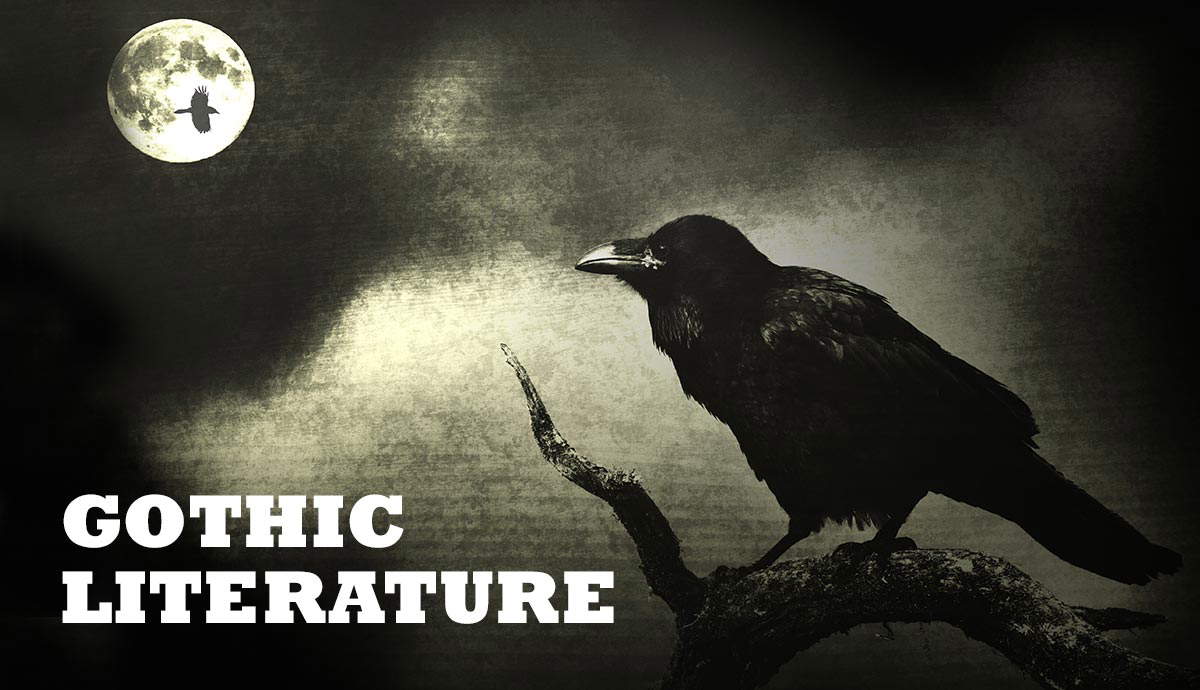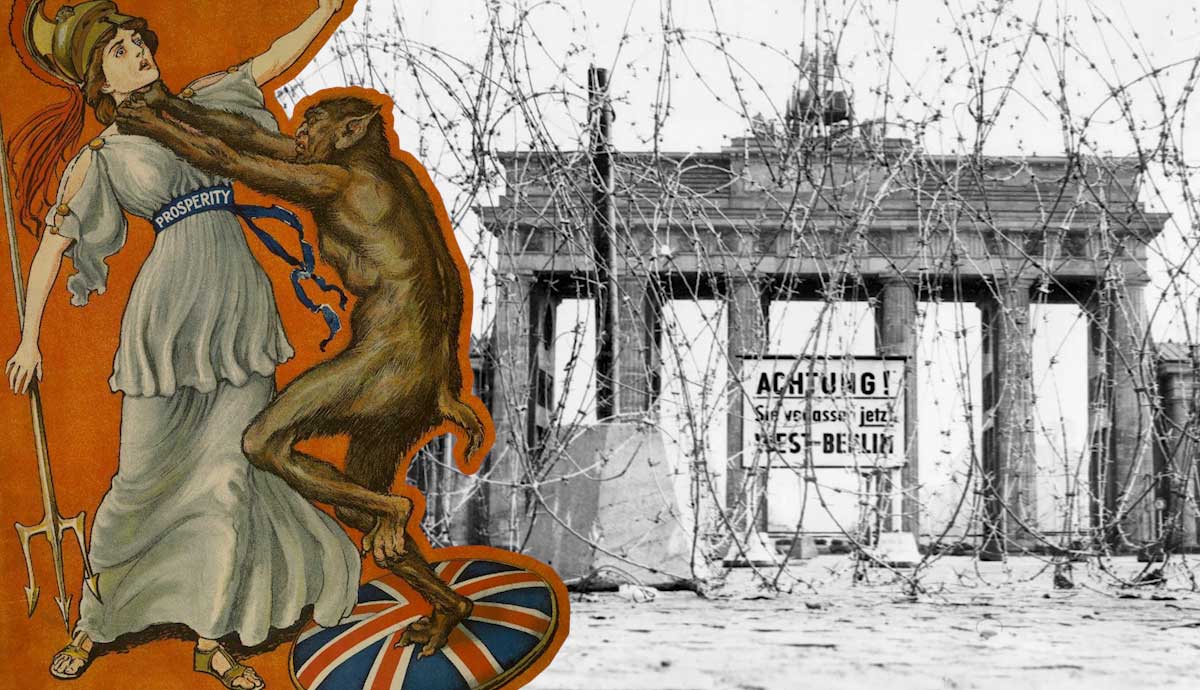
Radclyffe Hall’s 1928 novel The Well of Loneliness made her an icon of queer literature and went on to herald a wave of pulp lesbian fiction later in the twentieth century – but not without serious legal battles. Tried for obscenity in both the UK and the US legal systems, Hall’s novel was alternately vilified as dangerous propaganda that would corrupt the morals of its readers and championed as a necessary plea for tolerance and acceptance (as opposed to fear and hatred) of lesbian relationships. Here, we will explore Hall’s landmark novel, where the UK law stood on same-sex relationships between women in the early twentieth century, the outcome of the UK trial, and the ways in which it differed from the US trial that followed shortly after.
Background: Radclyffe Hall and a Summary of The Well of Loneliness

Born Marguerite Antonia Radclyffe Hall, the writer Radclyffe Hall was a woman of considerable fortune, which she had inherited from her womanizing father and which freed her from any financial incentives to marry. Instead, Hall, an out lesbian who dressed in traditionally masculine clothes, spent much of her twenties in relationships with other young women before meeting Mabel Batten, an older married woman with an adult daughter, and later (through Batten) Una Trourbridge, Batten’s cousin, with whom Hall would remain until her death.
Like Hall, Stephen Gordon, the protagonist of The Well of Loneliness, is a masculine-presenting lesbian who enjoys typically male sporting pursuits, hates wearing women’s clothing and wearing her hair long, and is attracted to other women. Named Stephen as her parents had been hoping for a boy, even as a child, she is described as “narrow-hipped” and “wide-shouldered,” and she longs to be a boy. She is doted on by her father, who understands her homosexuality, though he dies without ever stating as much.
Spurned by society and her own mother, Stephen’s quest for love and acceptance takes her to the battlefields of World War I (based heavily on the lived experiences of Hall’s friend Toupie Lowther within the only women’s unit to serve on the French frontline) and to Paris, where there were no laws prohibiting same-sex relationships between men (unlike in the United Kingdom) and so gay subculture thrives. Yet Stephen finds that society’s view of sexuality is at odds with her happiness, and the novel ends with Stephen’s earnest prayer to God to “[g]ive us also the right to our existence.”
The Case for the Prosecution: Why Was The Well of Loneliness Put on Trial?

Before the novel came to publication, Hall knew she was dealing with dangerous material and was, by her own admission, attempting something never before broached in literary fiction. She wrote to her publisher, Jonathan Cape, earlier in 1928, stating that she had “put [her] pen at the service of some of the most persecuted and misunderstood people in the world” – a group to which Hall, as an out lesbian, herself belonged. Jonathan Cape, however, was not to be deterred, and the novel was published in July 1928.
In describing the life and experiences of her out lesbian protagonist, Stephen Gordon, Hall was dealing with subject matter that was not only considered taboo but unnatural among more conservative circles (whose views are echoed by the character of Stephen’s own mother, who tells her that “[t]his thing [she is] is a sin against creation”). Though the Labouchere Amendment had criminalized all sexual acts between two men, homosexual acts between women were not, strictly speaking, classed as criminal acts – though that does not mean the law did not find ways of punishing lesbian couples. For instance, Caroline Derry notes that, during the eighteenth century, there were cases of marriage between outwardly heterosexual couples in which the “husband” was later found to be legally a woman.

It was on these grounds, then, that James Douglas, the editor of the Sunday Express, vociferously objected to Hall’s novel, arguing that it was a work of propaganda mislabeled as fiction. He even went so far as to state that he would sooner “give a healthy boy or a healthy girl a phial of prussic acid than this novel” – statements that implied that The Well of Loneliness had the capacity (if not the outright intention) of corrupting the morals of young men and women, or, to borrow Douglas’ own phrase, of “defiling young souls.” Douglas’ wording is pointed, as, according to the Hicklin test, a work could be deemed obscene on the basis that it might “deprave and corrupt those whose minds are open to such immoral influences.”
Such was Douglas’ loathing of The Well of Loneliness that he pushed for the British Home Secretary to have the novel suppressed. Douglas and William Joynson-Hicks, the Home Secretary at the time, were well-matched in their conservative sensibilities. Joynson-Hicks also seized typescripts of D. H. Lawrence’s poetry collection Pansies in 1929, suppressed birth control publications, and had designs to crack down on nightclubs by organizing raids. Hall and The Well of Loneliness were thus duly taken to court over charges of obscenity, with the trial commencing on November 28, 1928.
The Defense

In early reviews of the novel – before the trial had even been mooted – many fellow writers had praised Hall’s frankness, including the writer Vera Brittain, who observed that The Well of Loneliness was further proof “that there is no problem which is not better stated frankly than concealed,” since “persecution and disgusted ostracism have never saved any difficult in the world.”
Moreover, Leonard Woolf and E. M. Forster co-drafted a letter protesting against the suppression of Hall’s novel, which bore signatures from the likes of T. S. Eliot, Arnold Bennett, Ethel Smyth, and the aforementioned Vera Brittain. However, the letter was never published, as Hall wanted Woolf and Forster to argue that the novel was a work of literary genius – a view they did not share.

Confident, therefore, of the support of the day’s writers and intellectuals, Hall’s publishers sent 160 letters to those they felt would likely bear witness in the trial against the novel’s censorship. Not as many writers and thinkers as they had hoped, however, were forthcoming – which Virginia Woolf lambasted in a letter to her nephew: “Most of our friends are trying to evade the witness box; for reasons you may guess. But they generally put it down to the weak heart of a father, or a cousin who is about to have twins.”
The trial, however, did put some queer members of the Bloomsbury Group in something of a bind. While Woolf’s lover Vita Sackville-West was prepared to testify, she was also a married woman of wealth, power, and connections, being married to the diplomat (and later Labour politician) Harold Nicolson.

Lytton Strachey, a fellow queer member of the Bloomsbury Group, was also willing to testify, though he wrote to E. M. Forster that he personally thought the literary quality of the novel was “pretty dreadful.” These sentiments were echoed by Woolf herself, who dismissed The Well of Loneliness as a “pale tepid vapid book.”
The judge’s ruling that fellow writers of fiction could only make pronouncements on a work’s artistic value rather than its obscenity thus rescued Woolf and her contemporary writers from taking the stand. Nonetheless, 57 writers, intellectuals, and scientists did agree to take the stand in defense of The Well of Loneliness.
The Verdict & Aftermath

A week after the trial had begun, the judge, Sir Chartres Biron, ruled that The Well of Loneliness was indeed obscene, copies of the novel were to be confiscated and destroyed, and the defendants were to cover all legal fees incurred by the trial. Though this ruling was appealed, Biron’s ruling was upheld by five other magistrates.
Initially, US publishers were somewhat cowed by the UK trial, so though Alfred A. Knopf had acquired the rights to the novel, they declined to publish it. However, Pascale Covici and Donald Friede took out a $10,000 bank loan in order to buy the rights to the novel from Jonathan Cape. Having secured the rights, they then took preemptive measures to defend the novel against similar accusations of obscenity. For example, they contacted the head of the New York Society for the Suppression of Vice with the offer of selling him a copy of the novel.
By the time the NYPD confiscated 865 copies of the novel at the publisher’s office, the novel had been in circulation in the States for a year, selling 100,000 copies, thanks in no small part to the hint of infamy attached to it following the UK trial. Unlike in the UK, however, under US federal law, the argument of literary merit was permitted as mitigation against the charge of obscenity – a fact that the defense used to their advantage this time around. Among those who took to the stand to defend Hall’s novel were Ernest Hemingway, F. Scott Fitzgerald, Sherwood Anderson, Upton Sinclair, John Dos Passos, and Edna St. Vincent Millay.

On August 19, 1929, New York’s Court of Special Sessions ruled that, in grappling with what it termed “a delicate social problem,” the novel had not, in fact, broken the law. The charges against The Well of Loneliness were dropped, and the novel could therefore be circulated freely.
It is noteworthy that three other novels that deal with lesbianism were also published in the UK in 1928: Elizabeth Bowen’s The Hotel, Compton Mackenzie’s Extraordinary Women, and Virginia Woolf’s Orlando. Woolf and Mackenzie both adopt a more playful tone than that of Hall, while Bowen’s treatment of same-sex relationships is far more oblique.
In the aftermath of the UK trial’s guilty verdict, Woolf expressed her fear that, since writers can only “produce great literature” if they have “free minds” and as nothing prevents freedom of thought like a “taboo,” writing itself would become “cramped” and overly cautious. The publication of Orlando, The Hotel, and Extraordinary Women, however, would suggest that the trial of The Well of Loneliness did not have entirely the chilling effect she had feared.
Nonetheless, The Well of Loneliness remains a landmark work of lesbian fiction as the first work to depict, openly and earnestly, the lived experience of a lesbian woman in the early twentieth century, during a time when homosexual acts between men were illegal in the United Kingdom, and to call for social change. The UK trial and the verdict Sir Biron reached was therefore every bit as illiberal as Woolf had feared. Yet, thanks to Covici and Friede, even a guilty verdict could not stop Hall from becoming an icon of queer literature.










